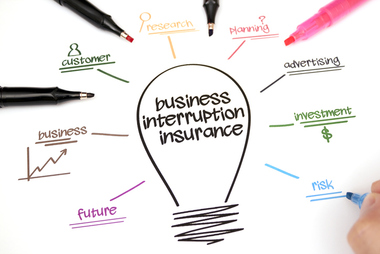Depending on business size, interruption insurance policy costs could range from $750 to $10,000 or more. If you have passed on insurance due to cost, consider this: Today there are a greater number of earthquakes, storms, floods and heatwaves damaging businesses in major ways. Since 1970, the number of disasters has more than quadrupled worldwide. Now may be a good time to reconsider.
What is interruption insurance and how does it work?
Most standard business insurance policies cover only loss or damage to such tangible items as your equipment and inventory, your warehouse, your office or store, but not lost profits if your business cannot operate. With business interruption coverage added to your business policy, you’ll document your current net income.
If your net profits are substantial, watch out for policies that offer low per-incident limits; $30,000 per incident is common. You don’t want to cap coverage far below the amount you need.
Your company may be growing quickly, so document many months of profits to demonstrate that income is accelerating. If you suffer an interruption, you’ll be able to project that income would have continued to grow. Otherwise, the insurer will try to limit your coverage to the amount of the past year’s profits.
What types of interruptions do you want to cover?
Interruption coverage mirrors what you covered in your main business policy. For example, if you didn’t include flood coverage in your general policy, you won’t have interruption insurance for flooding either. What about loss of utilities? Obviously, this is something that you’d want covered if transmission lines are downed, which is likely in a natural disaster. Standard interruption policies exclude this. You’ll need to add a rider to your policy for this.
How do you calculate coverage?
Envision how your business would be affected by a catastrophe. For example, examine all the costs that would continue even if your business couldn’t operate—loans, lease payments and taxes.
What charges may cease? Perhaps utility service to a destroyed building. If you want to keep your workers on the payroll while you rebuild because you want to avoid losing skilled labor, your insurance can reimburse you for salaries. You should know that interruption insurance doesn’t take care of every possible disaster cost. For instance, if you leave your destroyed warehouse while renting another that costs more, interruption insurance will cover only the old rate. Building replacement will also likely be more expensive due to new costs and modern material costs. To cover these, you’ll need an extra expense rider—a type of provision that can reimburse for the cost of moving inventory.
Your business is at risk when related businesses are affected by disaster. For example, an explosion at your website host’s server farm can take your site down or a hurricane can wipe out a key supplier.
These types of events hurt financial results even though your own facilities aren’t damaged. Contingent business insurance covers your lost profits in these disaster scenarios.
How do you get reimbursed?
Insurers generally exclude the first few days after a disaster from their calculations, so put aside what you’d need in cash to cover those costs. Furnish your insurer with extensive documentation of your lost profits. This would mean that if you save records electronically off-premises or store printed copies offsite, you’ll still be able to prove losses even though your main facilities have been destroyed.
We’ve seen some terrible weather-related disasters in recent years and incidents that have caused tremendous damage. Given that the number of costly disasters is rising, it’s best to be prepared and less at risk.


